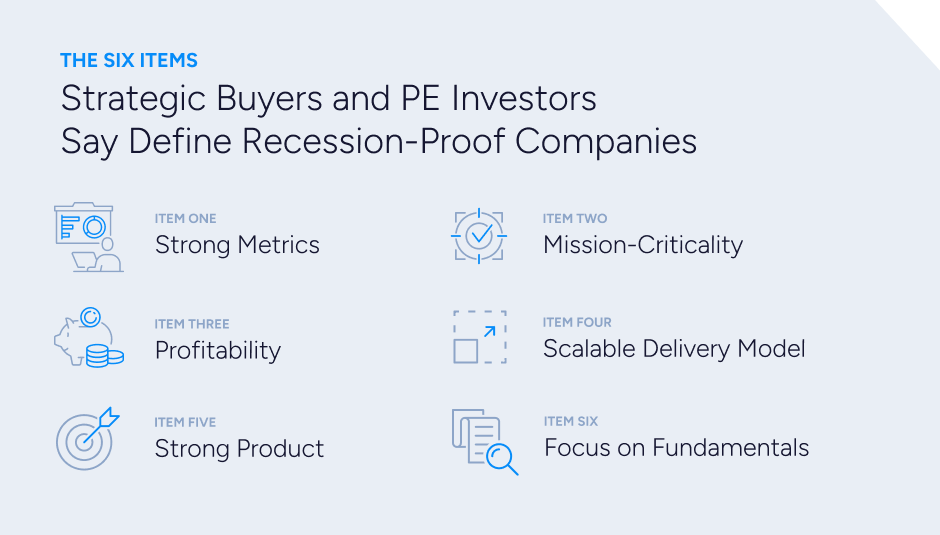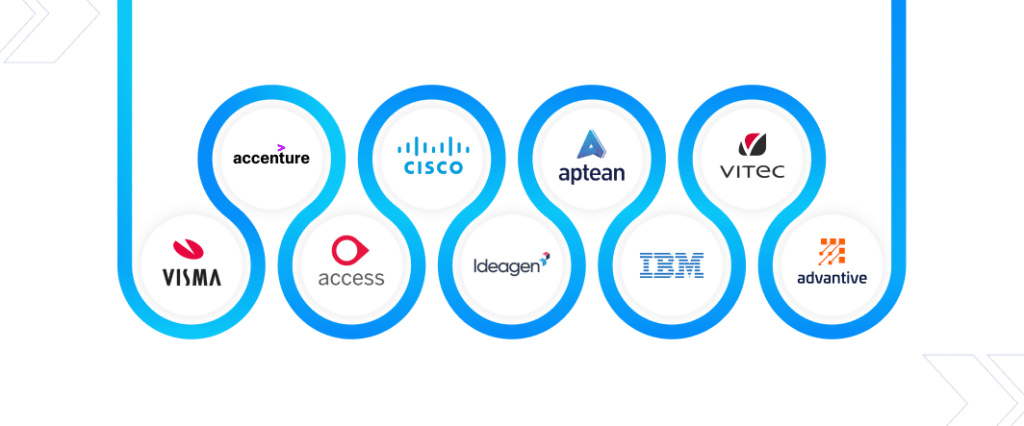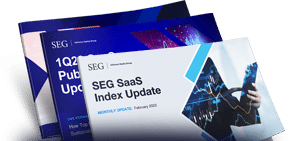The Perfect Formula for Recession-Proof Software Businesses Today

While many of the elements that define attractive investment opportunities remain somewhat consistent, buyers and investors do tend to place more emphasis on certain criteria depending on the broader economic conditions. These are a set of criteria that lead to recession-proof businesses.
Much of the past year has been dominated by fears of an economic downturn, which in turn have strongly influenced the SaaS M&A market. While the most recent economic news suggests we might be in for a softer landing than originally anticipated, buyers and investors will undoubtedly remain cautious as long as there is still a chance of recession.
We wanted to gain deeper insight into what matters most to buyers or investors considering new investments today, so we surveyed the top private equity investors and strategic buyers at leading software-focused firms and found a common theme throughout their responses: more than ever, investors are focused on acquiring mission-critical and recession-proof businesses.
Below are the six items that contribute to how investors and buyers define recession-proof businesses.
#1. Strong Metrics
While buyers and investors consider many factors when evaluating opportunities, revenue growth and gross retention are among the most important to them today, according to our recent State of SaaS M&A: Buyers’ Perspectives survey report.
Over 75% of private equity investors and strategic buyers we surveyed placed revenue growth among the top three most crucial factors when looking at targets. Strong revenue growth indicates good sales and marketing strategies as well as overall financial health, so consider this an important metric when there’s a chance of recession and you want to know where to focus your efforts. Current revenue growth is also a predictor of future growth and helpful in comparing a company’s performance to its competitors. As you will see below, however, growth needs to be realistic and profitable to be considered attractive.
As for gross retention, 57% of buyers and investors placed it in the top three most important metrics, with 26% putting it as number one. A high retention rate demonstrates a company’s ability to retain customers and meet customer expectations, which in turn speaks to strong customer loyalty and mission-criticality, both important considerations in the face of an economic downturn.

#2. Mission-Critical Industry or Functionality
As buyers and investors have adapted to the current macroeconomic outlook, they are prioritizing durable and sustainable M&A targets. When we asked investors an open-ended question about what qualitative metrics were most attractive to them in today’s market, more than 71% indicated they care most about companies that are “mission-critical”.
There are several ways to define this type of company. It could mean supporting an industry considered to be essential, such as agriculture, healthcare, government, food and beverage, manufacturing, or life sciences.
Another way to look at this is how critical your technology is to business operations. Software that supports ERP systems, supply chains, or security, for instance, can have widespread implications for many industries. They are essential for the day-to-day business of their end customers from an operations, regulatory, or compliance perspective. This makes it painful and challenging for end users to switch providers and nearly impossible for them to forgo a solution altogether.
The data in our latest Quarterly SaaS M&A and Public Market Report shows that DevOps & IT Management and ERP & Supply Chain posted higher median revenue multiples in 3Q23 than in 3Q22. These were the only two product categories to improve valuations over that time, primarily due to their mission-critical nature and crucial customer reliance on the product offerings.
#3. Profitability
In 2020 and 2021, the high-burn, growth-at-all-cost model was considered an attractive asset, but as the economy has cooled, buyers and investors have become more risk-averse. Profitability is now a fundamental prerequisite before many buyers and investors will even consider a company. Qualitative responses from both parties indicate that profitability and the Rule of 40 are now deal breakers — or makers, with many describing profitability as a binary dynamic in M&A today.
#4. Scalable Delivery Model
At a time when digital transformation is a high priority for most organizations, cloud-based SaaS businesses are much more attractive to the market compared to on-premise solutions. These solutions are easier to implement and don’t require a large upfront investment or significant costs to update and maintain. They also allow for greater flexibility, resulting in recession-proof businesses.
#5. Strong Product
Whether or not an organization is able to withstand challenging economic times comes down to two things: its product and its value to customers. Is the product truly different from other solutions on the market? Is it integral to operations? How difficult would it be for customers to switch to an alternative? These are all important questions CEOs should continue to reassess as the market changes, budget priorities shift, and new competitors enter the scene.
#6. Recession-Proof Businesses Focus on Fundamentals
Despite the chance of a recession, our quarterly research and investor survey show there’s still strong demand and investor appetite for profitable, mission-critical businesses. Even if your company doesn’t have a mission-critical function, you can focus on other fundamentals — including enhancing your product offering, ensuring you have an efficient and cost-effective delivery model, and staying committed to customer success.
How Much are Recession-Proof Businesses Worth?
Is your SaaS company considered a recession-proof business in the eyes of strategic buyers and PE investors? Our team of experienced M&A advisors can offer guidance on how to maximize your company’s valuation and position your company as an attractive opportunity for investors when the time is right. Get in touch with our team for a strategic assessment that will uncover your metric performance and provide strategic insights on how you can set your company up for success prior to entering the market.










